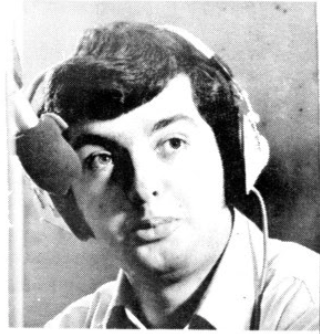Woody Goulart

Graduation year and major:
1973 and journalism with a concentration in broadcasting
Position at KCPR:
I got to be the News Director. I was in the journalism program to be in the journalism profession, which I took to mean research what’s going on in the world, talk to people, interview people, and try and find what could be called factual information. It was always nonfiction writing. You would be very careful and not inject your own personal opinion. It was very conservative in the sense of learning how to write [and] how to interview people.
Even though I was in journalism, I suddenly discovered I have this obsession with satire. So I turned a daily news program on KCPR into a satire. It really wasn’t about news. It was about satire. I don’t know what I was thinking. Again, it seems like – why would anyone let someone who, I think I was 20 years old at the time, get away with doing that? Maybe nobody was listening? I don’t know. It was not factual nonfiction writing. It was meant to make people laugh and to make people wince while they’re laughing. That’s how I approached the daily news at KCPR.
Favorite part about working for KCPR:
Not surprisingly, I would say, is the freedom to create what I wanted to create. I met Ed Zucchelli, the faculty in journalism and he became my advisor. He had a major influence on my life and he encouraged me to be what I wanted to be on the radio.
The main thing I found [to be the] most helpful to me was the freedom that I was given at KCPR to do the madness or mania that certainly was not straightforward news reporting; that we are expected today to think of when we think of journalism. It’s just incredible as I look back. Freedom. It was all about freedom for Woody and his co-conspirators at KCPR.
Where do you currently work and what do you do?
I am in Las Vegas, Nevada now. I coach people skills, life skills, however you’d like to think of it, and I sell training, guidance and e-books that people can buy for self-help. I haven’t been on the radio in many moons, but I do have a podcast that I produce. I am the host. I suppose there’s madness and mania in that as well. So 50 years later, I’ve gone from a 10 watt FM radio station in San Luis Obispo, California to a podcast that’s available around the world.
How did, if at all, KCPR help or prepare you for your career trajectory?
From a very early age, I wanted to work in Los Angeles. I was very focused on getting to work in Los Angeles radio, which is very, very difficult to do. KCPR led directly to me getting to work in Los Angeles right away. I finished at Cal Poly in 1973 and I was already working in Los Angeles on Sunset Boulevard in Hollywood. I just couldn’t believe it. So that’s the consequence of my experience at Cal Poly San Luis Obispo and KCPR.
I was hired to do the production of commercials. It was all about writing. It was all about the way I approach the subject matter. If I were selling a telephone service, I wouldn’t just sell a telephone service. I would tell a story about the use of the telephone or the interaction of people in a neighborhood over the telephone. I was very successful writing commercials in LA. I also did news documentaries. They were very short, two to three minutes that we played in between the music. The thing I’m the proudest of was – I got to talk to Gene Roddenberry who created Star Trek. I did a documentary on the radio about Roddenberry and about Star Trek.
I got to meet a guy by the name of Bill Drake. He was very famous for having set up BOSS radio in Los Angeles on KHJ in 1965. I met him not quite ten years after, but he was someone that I really respected. I was able to convince Bill Drake to let me interview him and I ended up writing a book about BOSS Radio KHJ, Los Angeles, which is really about rock and roll radio at a time when it was very important.

